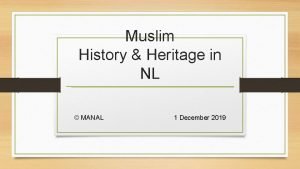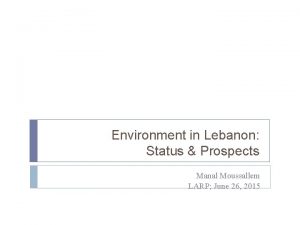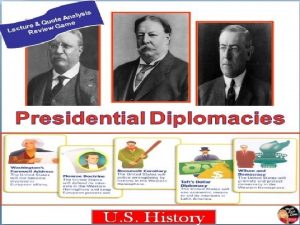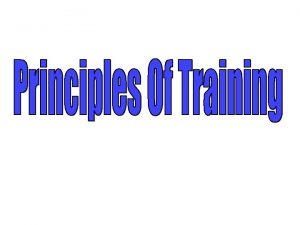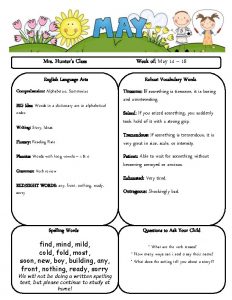Mrs Manal Alsolami Mrs Shaikha Alhogail Chapter 7





































- Slides: 37

Mrs. Manal Alsolami & Mrs. Shaikha Alhogail Chapter 7: Multiplying Effectiveness

• Effective Delegation • How to Assign Work • The Role of Personality Mrs. Manal Alsolami & Mrs. Shaikha Alhogail Agenda:

Effective Delegation is the transfer of responsibility for the performance of an activity from one individual to another while retaining accountability for the outcome. Mrs. Manal Alsolami & Mrs. Shaikha Alhogail • Delegation:

Effective Delegation 1. 2. 3. 4. 5. 6. Select the person for the task Define the task Gain the subordinate`s views Give authority and resources to perform the task Use checkpoints to review progress Hold accountable/ reward results Mrs. Manal Alsolami & Mrs. Shaikha Alhogail • Steps and rules for effective delegation

• The rules for effective delegation apply to leading individuals as well as groups. The rules will maximize the job performance and work moral of employee, and will increase the overall productivity of their work group. Mrs. Manal Alsolami & Mrs. Shaikha Alhogail The rules for effective delegation:

1. Share power with employee 2. Do not delegate the bad job, and save the good one for yourself 3. Know your employees 4. Use delegation as a development tool 5. Delegate work fairly among all employees 6. When you delegate authority, be sure to back your employees if that authority is questioned 7. Let employees know what decision they have authority to make and delegate decision making to the lowest possible level Mrs. Manal Alsolami & Mrs. Shaikha Alhogail The rules for effective delegation:

8. Delegate with consistency 9. Delegate whole tasks so that employees can see projects through to completion; allow sufficient time to get jobs done. 10. Insist on clear communication 11. Make good use of question when you delegating work 12. Explain the importance of assignments 13. Learn to live with work styles that are not like your own 14. Avoid delegating tasks that are pets, personal, or petty 15. Follow the three D`s for all work- do it, delegate it, or ditch it. Mrs. Manal Alsolami & Mrs. Shaikha Alhogail The rules for effective delegation:

Assigning work effectively is one of the most important skills of the successful leader. • The list of proven principles for performing this leadership task: 1. Consider the availability of the employee`s time and whether this is the ideal person to do the job. common mistake is for the leader to assign a job to the one who can get it done, even if this is the same person over and over again. This practice creates three problems: a. The overworked employee does not know the priority of many assignments b. The overworked employee become resentful c. The abilities of underworked employees are wasted or never developed. Mrs. Manal Alsolami & Mrs. Shaikha Alhogail Assigning work effectively

Assigning work effectively 2. Use work assignments as a means of developing people 3. Know exactly what you want to communicate before giving an order confusion on the leaders` part creates doubt and lack of confidence in employees (clarity). 4. Ask rather than tell, but leave no doubt that you expect compliance. This approach shows both courtesy and respect. You can usually obtain more cooperating by asking for assistance than by commanding others to do job. 5. Use the correct language for the employee`s training level. Most occupations and jobs have abbreviations, slang words, and technical language that the new or untrained person will not understand. Mrs. Manal Alsolami & Mrs. Shaikha Alhogail Assign the task for person who is not familiar with it, and as a result he will develop his skills.

6. Make assignment in a logical sequence, using clear and concise language. People will easily remember things best that are clearly stated. 7. Be considerate but never apologetic when asking someone to do a job. 8. Talk deliberately and authoritatively, but avoid shouting across a room or making unnecessary show of power. 9. Take responsibility for the orders you give. 10. Give people the opportunity to ask questions and express opinions 11. Follow up to make sure assignment carried out properly and modify them if the situation warrants. Mrs. Manal Alsolami & Mrs. Shaikha Alhogail Assigning work effectively

Management roles and skills: Mrs. Manal Alsolami & Mrs. Shaikha Alhogail Leader`s effectiveness depends on knowledge and skills in solving organizational problems. Further, the types of problems to be solved depend on the Leader`s role or level of responsibility.

Management roles and skills: proficient in a specific type of work or activity. It includes detailed job knowledge, hands-on expertise, and the specialized use of equipment, techniques, and procedures. Both the technical expert and the work group supervisor should have a high degree of technical skills • Relational skill: refer to having a knowledge about and being able to work with people. It include the ability to motivate, coordinate and advise other people, either as individuals or as a group. Sensitivity in human relation and a willingness to help other are essential elements of relational expertise. Success at all levels of management requires good human relation skills. Mrs. Manal Alsolami & Mrs. Shaikha Alhogail • Technical skill: refer to having a knowledge about and being

Management roles and skills: being able to work with concept and ideas. It include the ability to think abstractly. Long-range planning, strategic decision making and the weighing of ethical considerations in employee, customer, and government relation all require conceptual skills. Mrs. Manal Alsolami & Mrs. Shaikha Alhogail • Conceptual skill: refer to having a knowledge about and

• In hiring employee, each has special qualities and would make valuable contributions. However, each is different in style of interpersonal relations, and each would require different treatment to be both happy and productive. • People are products of their culture- family, town and country. Thus, style of interpersonal relations is influenced by how we are raised. Societies teach and reinforce behavior styles. • Because personality is a social construct, it involves crosscultural variations. • Effective leader value differences and Strive to make best use of the contributions of all people Mrs. Manal Alsolami & Mrs. Shaikha Alhogail The role of personality

Personality and Culture • Our style of interpersonal relations is influenced by how we are raised • Societies teach and reinforce behavior styles • Personality is a personal construct and involves cross-cultural variations • Studies show that style of interpersonal relations is a basic dimension or characteristic Mrs. Manal Alsolami & Mrs. Shaikha Alhogail • People are products of their culture

Personality and Culture • Traditional social orientations • Put the needs and interests of the group above the individual • Individualistic social orientations • Participative social orientations • Middle ground between the two above • Warm and supportive human relations Mrs. Manal Alsolami & Mrs. Shaikha Alhogail • Separate the self from others

Personality and Culture • Traditional cultures are formal and structured: • England, Germany, Spain, Japan, China, India • U. S. is 60% participative • Individualistic cultures: • French, Italian, and Greek Mrs. Manal Alsolami & Mrs. Shaikha Alhogail • Participative cultures develop in melting pot societies:

Personality and Culture • Exceptions to the generalizations: • Describing groups of people should not obscure the diversity and variation of individuals • Certain qualities belong to all people: • Honesty • Concern for others • Open-mindedness Mrs. Manal Alsolami & Mrs. Shaikha Alhogail • Human traits vary in degrees • A person is a mixture of all three styles

Understanding Others • Certain characteristics distinguish each interpersonal style • Easy to understand • Hard to understand Mrs. Manal Alsolami & Mrs. Shaikha Alhogail • Helps to explain why some people are:

Characteristics that Distinguish each interpersonal style: • Traditional: are comfortable with rules, practices, and procedures • Participative: prefer interpersonal commitment as a form of control • Individualists: dislike the idea of restricted freedom 1. Basis of action • Traditional: basis is direction from authorities in which they believe • Participative: basis is discussion and agreement with others • Individualists: basis is direction from within Mrs. Manal Alsolami & Mrs. Shaikha Alhogail 1. Form of control

Characteristics that Distinguish each interpersonal style: 3. To be avoided 4. Perception of Responsibility • Traditional: believe highest allegiance should go to subordinate powers • Participative: feel responsible to help others • Individualists: assign responsibility for their actions to their own conscience Mrs. Manal Alsolami & Mrs. Shaikha Alhogail • Traditional: avoid deviation from authoritative direction • Participative: avoid confrontation and strive to reach agreement • Individualists: avoid not being themselves

Characteristics that Distinguish each interpersonal style: • Traditional: value organization and order • Participative: value group consensus and smooth human relations • Individualists: value independence and freedom 6. Basis for growth • Traditional: believe there is a time and place for everything • Participative: prefer growth through human interaction • Individualists: prefer growth through introspection and selfanalysis Mrs. Manal Alsolami & Mrs. Shaikha Alhogail 5. Goals desired

Characteristics that Distinguish each interpersonal style: • Traditional: are comfortable as members of the hierarchy • Participative: are comfortable as members of the team • Individualists: are most comfortable as separate people 8. Material goods • Traditional: are excellent competitors • Participative: collaborate to get material goods • Individualists: think that everyone should have material goods Mrs. Manal Alsolami & Mrs. Shaikha Alhogail 7. Position in relation to others

Characteristics that Distinguish each interpersonal style: • Traditional: loyalty is to the organization • Participative: loyalty is to the group • Individualists: do not value loyalty, but when they have it, they have it intensely for the person or ideal they deem worthy 10. Time perspective • Traditional: perspective is the future • Participative: perspective is the near future • Individualists: perspective is the present Diversity gives strength to the society Mrs. Manal Alsolami & Mrs. Shaikha Alhogail 9. Identification and loyalty

• Differences in personality result in perceptions and judgments that are poles apart • Awareness of the nature and needs of different types of people is the first step in building relationships • This awareness can lead to new levels of cooperation and success • Most people have characteristics of all styles, but prefer one or two Mrs. Manal Alsolami & Mrs. Shaikha Alhogail Dealing with Different Types of People

1. Provide work rules and job descriptions with duties spelled out in priority order 2. Provide an organization chart 3. Respect traditions and established ways 4. Avoid changes when possible 5. Accentuate reason over emotion 6. Mind your manners and language 7. Establish a career plan with benchmarks for progress, rewards expected, and time frames Mrs. Manal Alsolami & Mrs. Shaikha Alhogail Meeting the Needs of Traditional

8. Provide tangible rewards 9. Recognize good work with signs of status 10. Reinforce company loyalty 11. Communicate the mission, goals, and objectives 12. Provide an action plan 13. Keep work areas organized, clean, and safe 14. Be clear and logical when giving orders Mrs. Manal Alsolami & Mrs. Shaikha Alhogail Meeting the Needs of Traditional

1. 2. 3. 4. 5. Include them in the decision-making process Provide off-the-job social interaction Emphasize teamwork Regular, well-run staff meetings Ask for opinions, ask what is said, and demonstrate responsiveness 6. Get to know the person 7. Appeal to logic and feelings Mrs. Manal Alsolami & Mrs. Shaikha Alhogail Meeting the Needs of Participative

8. Use communication vehicles 9. Allow people skills to shine 10. Provide growth opportunities 11. Keep human relations smooth Mrs. Manal Alsolami & Mrs. Shaikha Alhogail Meeting the Needs of Participative

1. 2. 3. 4. 5. 6. Recognize independence and personal freedom Provide immediate rewards for performance Talk in terms of present Provide opportunities for growth Keep things stimulating and fun Focus on meaningful personal experiences, satisfying interpersonal relationships, and important social causes 7. Provide individual job assignments Mrs. Manal Alsolami & Mrs. Shaikha Alhogail Meeting the Needs of Individualist

8. Accentuate feelings and logic when handling problems 9. Reward good performance 10. Keep things casual 11. Avoid rigid controls 12. Treat the individualist as a separate person Mrs. Manal Alsolami & Mrs. Shaikha Alhogail Meeting the Needs of Individualist

• Differences in personality can result in communication problems • Misunderstandings can develop • Four steps to improve communication: • Step 1: Talk it out • Use the positive approach • Where: talk it out in private • When: talk it out when people are fresh • How: Is it true? Is it necessary? Is it kind? Mrs. Manal Alsolami & Mrs. Shaikha Alhogail Solving Personality Differences

• Step 2: Be understanding • Look at things from another person`s view • Try to understand the forces that have influenced and shaped a person`s personality Mrs. Manal Alsolami & Mrs. Shaikha Alhogail Solving Personality Differences

Solving Personality Differences • Step 3: Be flexible • Be willing to compromise • Everyone must be flexible • Differences in personality are unavoidable • Tolerance of different styles is necessary if communication is to be achieved Mrs. Manal Alsolami & Mrs. Shaikha Alhogail • Step 4: Be tolerant

• Different types of people need different treatment to be satisfied and achieve their potential • Traditional: are upset by the absence of planning and clear guidelines • Participative: are upset by conflict and impersonal relationships • Individualist: are upset by strict rules and close supervision • Effective leaders honor the needs of the three types of people Mrs. Manal Alsolami & Mrs. Shaikha Alhogail Different Styles Needs and Contributions

Mixing Personalities • Leaders should consider what members with different styles can gain from each other • As an organization experiences greater diversity, there is a need for greater tolerance • The positive qualities of all three people can help an organization achieve its full potential Mrs. Manal Alsolami & Mrs. Shaikha Alhogail • Interpersonal relations can add balance, flexibility, and overall effectiveness to a group

Interpersonal Styles • In dealing with other people the leader must: • The greatest good for all individuals can be achieved by working together • Diversity enriches individuals and groups • Consider the interests and meet the needs of others Mrs. Manal Alsolami & Mrs. Shaikha Alhogail • Understand value different types of people • Be wise, caring, and be flexible
 Manal nl
Manal nl Manal
Manal Manal moussallem
Manal moussallem Manal helal
Manal helal They are mrs garcia and mrs castro
They are mrs garcia and mrs castro They are mrs garcia and mrs castro
They are mrs garcia and mrs castro Mrs. darling was ___________ of mrs. s.
Mrs. darling was ___________ of mrs. s. Mrs lee chapter 11
Mrs lee chapter 11 Ttsmp 3
Ttsmp 3 Emily bronte summary
Emily bronte summary Character traits of tommy in the fun they had
Character traits of tommy in the fun they had Mrs turnbull world history
Mrs turnbull world history Homeroomm
Homeroomm Mrs weinstein's popcorn
Mrs weinstein's popcorn Mrs mulch
Mrs mulch Crocodile on the loose poem by mrs prejna
Crocodile on the loose poem by mrs prejna Mrs gren stands for
Mrs gren stands for When does mrs putnam accuse rebecca
When does mrs putnam accuse rebecca Mrs midas 10 mark question
Mrs midas 10 mark question Mrs skeletal
Mrs skeletal The great gatsby summary
The great gatsby summary The fur coat short story characters
The fur coat short story characters The teacher who lives next door to rob is mrs. johnson
The teacher who lives next door to rob is mrs. johnson Mrs bergmeier
Mrs bergmeier Mrs bergmeier
Mrs bergmeier Kiss of the vampire poster
Kiss of the vampire poster Mr twit description extract
Mr twit description extract Mrs 17
Mrs 17 Mrs 17
Mrs 17 Pride and prejudice miss lucas
Pride and prejudice miss lucas Describe
Describe Mrs palmieri
Mrs palmieri Mrs vopp
Mrs vopp Mrs tiresias poem
Mrs tiresias poem Mrs midas questions
Mrs midas questions Mrs midas duffy
Mrs midas duffy Mrs midas poem annotated
Mrs midas poem annotated Mrs hunter day
Mrs hunter day
